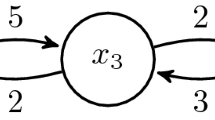Abstract
We formulate the problem of deciding which preference domains admit a non-dictatorial Arrovian Social Welfare Function as one of verifying the feasibility of an integer linear program. Many of the known results about the presence or absence of Arrovian social welfare functions, impossibility theorems in social choice theory, and properties of majority rule etc., can be derived in a simple and unified way from this integer program. We characterize those preference domains that admit a non-dictatorial, neutral Arrovian social welfare Function and give a polyhedral characterization of Arrovian social welfare functions on single-peaked domains.
Access this chapter
Tax calculation will be finalised at checkout
Purchases are for personal use only
Preview
Unable to display preview. Download preview PDF.
Similar content being viewed by others
References
Ahuja, R., T. L. Magnanti and J. B. Orlin. (1993). Network Flows: Theory, Applications and Algorithms, Prentice-Hall, Englewood Cliffs, New Jersey, U.S.A.
Arrow, K.J. (1963). Social Choice and Individual Values, Wiley, New York.
Gibbard, A. (1973). “Manipulation of Voting Schemes: A general result”, Econometrica, 41, 587–602.
P. C. Fishburn and J. S. Kelly (1997), Super Arrovian domains with strict preferences, SIAM J. Disc. Math., 11, pp. 83–95.
Kalai, E. and E. Muller. (1977). “Characterization of Domains Admitting Non-dictatorial Social Welfare Functions and Non-manipulable Voting Procedures”, J. of Economic Theory, 16,2, 457–469.
Kalai, E., E. Muller and M. Satterthwaite. (1979). “Social Welfare Functions when Preferences are Convex, Strictly Monotonic and Continuous”, Public Choice, 34, 87–97.
Le Breton, M. and J. Weymark. (1996). “An Introduction to Arrovian Social Welfare Functions on Economic and Political Domains”. In Collective Decision Making: Social Choice and Political Economy, edited by Norman Schofield, Kluwer Academic Publishers, Boston.
Maskin, E. (1995), “Majority Rule, Social Welfare Functions, and Game Forms”, in K. Basu, P.K. Pattanaik and K. Suzumura, eds., Choice, Welfare and Development (Oxford: Clarendon Press).
Moulin, H. (1980). “On Strategy-Proofness and Single Peakedness”, Public Choice, 35, 437–455.
Moulin, H. (1984). “Generalized Condorcet Winners for Single Peaked and Single Plateau Preferences”, Social Choice and Welfare, 1, 127–147.
Muller, E. and M. Satterthwaite. (1977). “The Equivalence of Strong Positive Association and Strategy-Proofness”, Journal of Economic Theory, 14, 412–418.
Nemhauser, G. and L. Wolsey. (1998). Integer and Combinatorial Optimization, John Wiley, New York.
Satterthwaite, M. (1975). “Strategy-Proofness and Arrow’s Conditions: Existence and correspondence theorems for voting procedures and social welfare functions”, J. of Economic Theory, 10, 187–217.
Sen, A. (1966). “A Possibility Theorem on Majority Decisions”, Econometrica, vol. 34, Issue 2, 491–499.
Teo, C.P. and J. Sethuraman (1998) “Geometry of fractional stable matchings and its applications”, Mathematics of Operations Research, Vol 23, Number 4, 874–891.
Author information
Authors and Affiliations
Editor information
Editors and Affiliations
Rights and permissions
Copyright information
© 2002 Springer-Verlag Berlin Heidelberg
About this paper
Cite this paper
Sethuraman, J., Teo, CP., Vohra, R.V. (2002). Integer Programming and Arrovian Social Welfare Functions. In: Cook, W.J., Schulz, A.S. (eds) Integer Programming and Combinatorial Optimization. IPCO 2002. Lecture Notes in Computer Science, vol 2337. Springer, Berlin, Heidelberg. https://doi.org/10.1007/3-540-47867-1_15
Download citation
DOI: https://doi.org/10.1007/3-540-47867-1_15
Published:
Publisher Name: Springer, Berlin, Heidelberg
Print ISBN: 978-3-540-43676-8
Online ISBN: 978-3-540-47867-6
eBook Packages: Springer Book Archive




